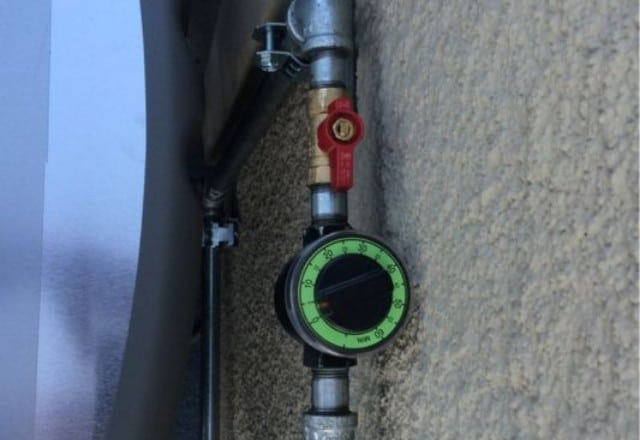
As a plumber with years of experience under my belt, I can’t stress enough how crucial it is to address gas line leaks immediately. These aren’t your run-of-the-mill plumbing issues – they’re potential disasters waiting to happen.
First and foremost, gas leaks pose a severe safety risk. Natural gas and propane are highly flammable. A single spark near a leak could trigger an explosion, putting your family and property in grave danger. Even without an explosion, gas accumulation in your home can lead to carbon monoxide poisoning, which is often silent and deadly. And carbon monoxide poisoning – a colorless, odorless gas that can cause serious health issues, including respiratory problems. Carbon monoxide is often produced when gas appliances malfunction, leading to incomplete combustion.
Beyond the immediate safety concerns, gas leaks can hit you hard in the wallet. That escaping gas isn’t free – you’re paying for fuel that’s literally vanishing into thin air. Over time, this can significantly inflate your energy bills.
There’s also the environmental impact to consider. Natural gas is a fossil fuel, and leaks contribute to greenhouse gas emissions. By promptly repairing leaks, you’re doing your part for the planet.
The health risks associated with gas leaks are compounded by the fact that they can occur without immediate detection, especially when the gas is odorless. This creates a dangerous situation where individuals may be exposed to harmful gases without realizing it. In households and businesses, the gas supply is essential for various functions, but it also represents a risk of leaks, which is why it’s crucial to understand the severity and implications of these leaks.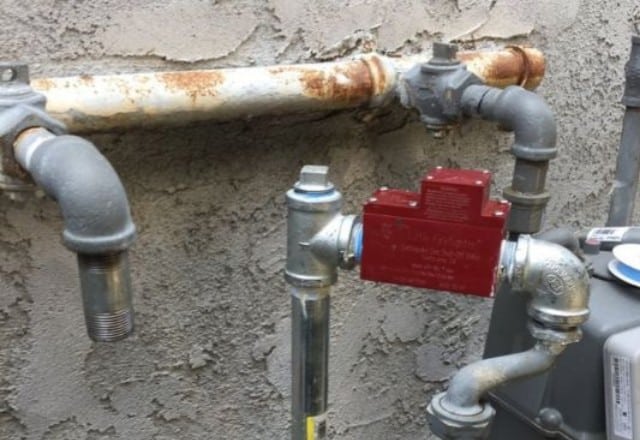
Recognizing the signs of a gas leak is crucial for taking timely action to prevent disasters.
If you notice any of these signs of gas leaks, it’s vital to act quickly and safely to address the issue. Recognizing these signs can be the difference between a minor incident and a major catastrophe.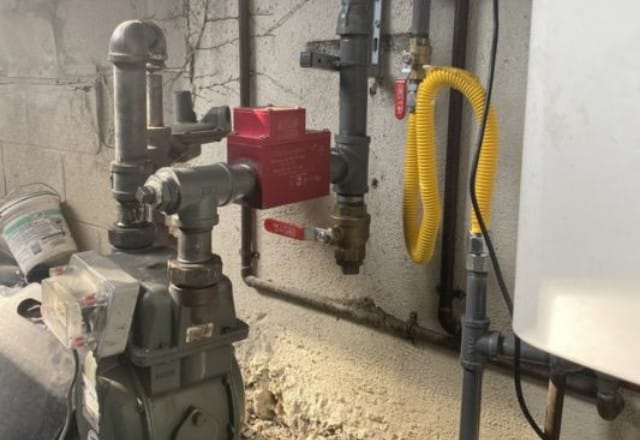
Now, detecting a gas leak isn’t always straightforward. While large leaks might produce a noticeable odor (thanks to the additives in the gas), smaller leaks can go unnoticed. That’s why it’s crucial to have regular inspections and to be alert for signs like dying plants near gas lines or unexplained increases in your gas bill. When a gas leak is suspected, safety precautions must be immediately implemented.
Safety experts and guidelines stress the importance of not underestimating any gas leak, as they pose significant safety hazards. These guidelines are designed to protect individuals and property from the dangers associated with gas leaks.
Never attempt to fix gas pipe leak issues yourself. These repairs require specialized tools and expertise. Even small leaks can become dangerous if not properly repaired.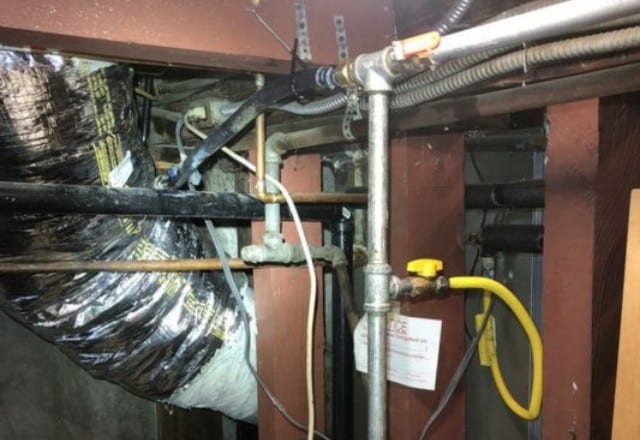
If you suspect a leak, don’t try to fix it yourself. Gas line repair isn’t a DIY job – it requires specialized tools, expertise, and often, permits. Attempting repairs on your own could lead to more damage or even cause an accident.
Instead, if you smell gas or suspect a leak, leave your home immediately and call your gas company or a licensed plumber from a safe distance. Don’t flip any switches or use your phone inside the house, as these could create sparks.
Once you have taken immediate safety measures, the next step is to seek professional assistance. Contact a plumber or a licensed technician who specializes in gas line repair services. These licensed professionals are equipped with the knowledge and tools necessary to safely assess and repair the leak.
These experts will conduct a thorough gas line inspection to determine the cause and extent of the leak. Their expertise allows them to identify not only major leaks but also minor issues that could lead to future problems. The repair process typically involves fixing or replacing damaged gas pipes and ensuring that the gas line system meets safety standards.
When dealing with a minor gas leak repair, professionals will first conduct pressure testing to determine the exact location and severity of the leak. Even small leaks require professional attention, as they can worsen over time.
When dealing with a gas leak, it’s imperative to take immediate safety actions and then rely on the expertise of professional repair services to ensure the issue is addressed effectively and safely. Their assessment and repairs are crucial in safeguarding against potential disasters.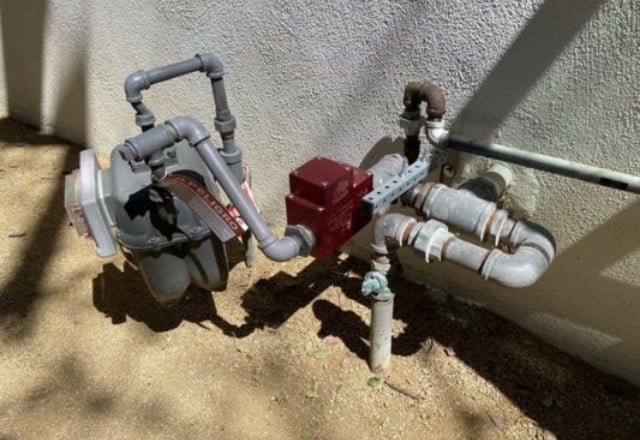
Professional gas line repair typically involves several approved methods, each suited to specific types of leaks and pipe conditions:
Complete Pipe Replacement
Pipe Section Repair
Regarding Sealant Products: While gas pipe leak sealer products exist in the market, these are typically temporary solutions and not recommended for permanent repairs. Professional plumbers will always recommend proper replacement or repair of the damaged section rather than using sealant products. Here’s why:
Limitations of Sealant Products:
Approved Repair Materials:
Quality Control Measures:
Preventing gas line issues requires a proactive approach centered around regular maintenance and inspections.
By regularly conducting these preventive measures, you can significantly reduce the likelihood of gas leaks and the associated risks.
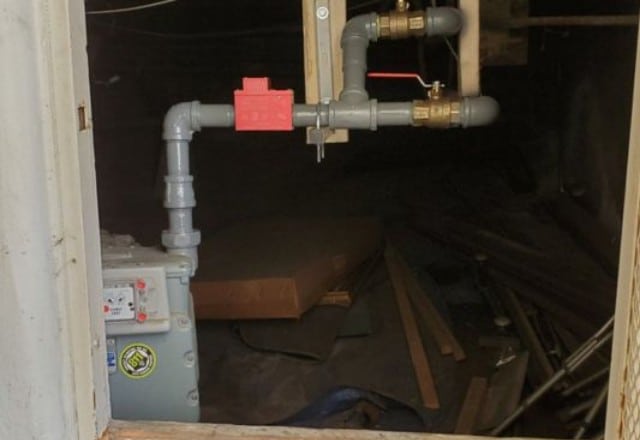
In the event of a gas leak, collaboration with gas companies and providers is crucial. Gas providers offer specialized gas line services, including emergency gas leak repairs.
In case of a leak, it’s important to contact professional emergency assistance immediately. Gas companies are equipped to handle such emergencies and can provide the necessary support to resolve the issue safely and efficiently.
These professionals have the training and equipment to safely repair leaks and prevent future incidents. Building a relationship with your gas provider ensures that you have access to timely and expert assistance whenever needed, especially in emergency situations.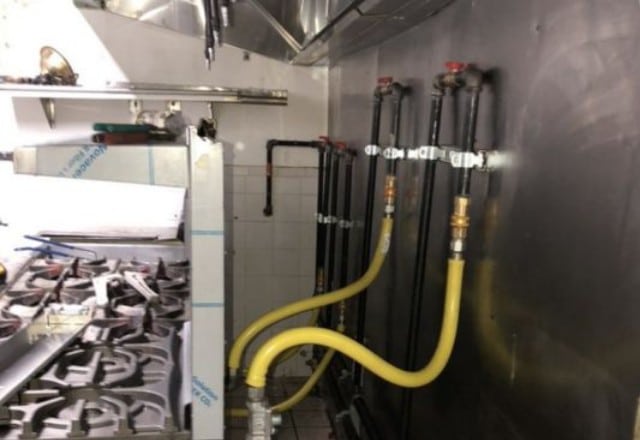
In gas leak situations, several special considerations should be taken into account for safety.
– Carbon monoxide detectors should be installed and regularly tested, especially in areas near gas appliances, to prevent carbon monoxide poisoning.
– It’s essential to ensure that electrical appliances, mobile devices, and electrical devices are kept away from the leak area to avoid igniting the gas.
– Regular checks of gas pipes, gas appliances, and connections can help identify minor leaks and prevent future leaks.
– In case of a gas leak, avoid using mobile phones or making phone calls near the leak area, as this could create sparks. Ensure that gas leak detectors are in place and functioning properly, as they can provide an early warning.
– Professional training on how to handle gas leaks and identify their exact location can be invaluable in preventing potential disasters. Regularly updating these skills and knowledge ensures that you are prepared to respond effectively in case of a gas leak.
By considering these factors and working closely with professionals, you can ensure the safety and integrity of your gas line system, protecting your property and loved ones from the dangers of gas leaks.
Remember, when it comes to gas line leaks, it’s always better to be safe than sorry. Don’t hesitate to call a professional if you have any doubts. Quick action could save lives, protect your property, and prevent costly repairs down the line. Stay safe, folks – your local plumber’s got your back when it comes to keeping those gas lines secure.
A: Yes, licensed plumbers who are certified for gas work are qualified to repair gas leaks. However, not all plumbers are certified for gas line work, so it’s important to verify their credentials and experience with gas systems. You should specifically look for plumbers who hold gas line certification, maintain current state or local licensing for gas work, and carry appropriate insurance coverage for gas line repairs. Their experience should match your specific type of gas system needs.
A: The cost of gas line repairs can vary significantly depending on several key factors. The location of the leak plays a major role, with accessible leaks generally costing less than those requiring excavation or wall access. The type and extent of damage also impacts cost, as does the length of pipe requiring replacement. Local labor rates and permit fees factor into the final price, and emergency repairs typically cost more than scheduled maintenance. While minor repairs might cost between $150-300, major line replacements can exceed $1000. It’s essential to obtain a detailed written estimate before any work begins.
A: When hiring a professional for gas line repair, it’s crucial to verify several important credentials. A qualified professional should possess current state or local licensing specific to gas work. They should carry comprehensive liability insurance coverage and, in some jurisdictions, maintain proper bonding. Experience with similar repairs is essential, and this can be verified through references from previous gas line work. Many qualified professionals also maintain membership in professional organizations. The best practice is to request physical copies of all credentials and independently verify them with the issuing authorities.
A: The duration of a gas line repair varies depending on the complexity of the issue. Simple pipe repairs might be completed in one to three hours, while full line replacements typically require four to eight hours. More complex system repairs could take up to two days to complete properly. Emergency repairs may be expedited, though permit acquisition might extend the timeline. It’s important to note that proper pressure testing after repairs requires additional time to ensure safety, as this crucial step cannot be rushed. The total duration includes not just the repair work but also the necessary testing and inspection periods to ensure everything meets safety standards.
Also read: Uncover: How Deep Are Gas Lines Buried?
I bring over 9 years of dedicated plumbing experience to the table. As a seasoned professional in the plumbing industry, I've tackled a wide range of projects, from residential repairs to large-scale commercial installations.

